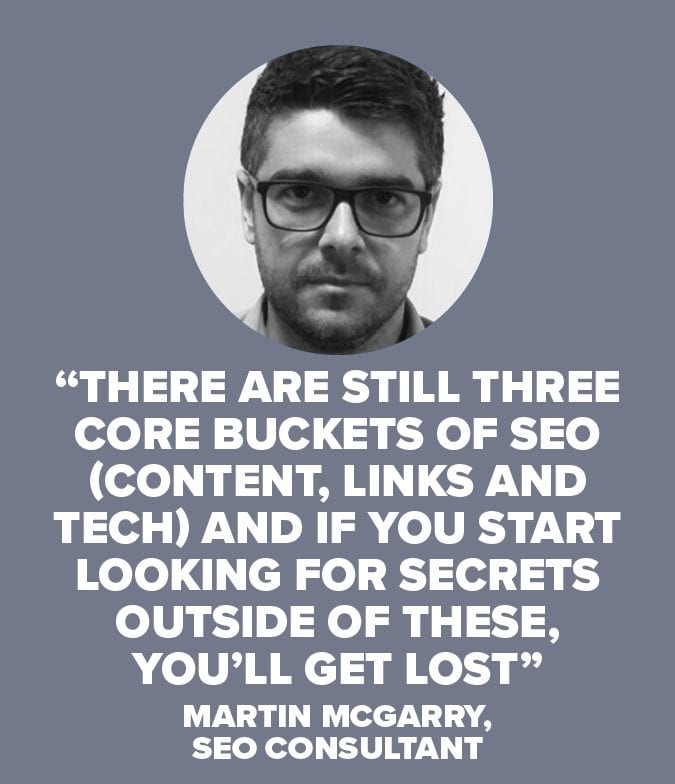The future of search? Stick with what works

In 2017, I sat on an iGB panel at the London Affiliate Conference, for a discussion titled The Future of Search, which has over the years become a commonplace conference talk topic.
Back then, audience members were keen for us to talk about the advancements in voice search and what technology we should be looking out for, and to hear us discuss the new trends that were about to hit the big time.
I might have disappointed the attendees to that particular session, who were probably waiting for the big knowledge bombs to drop! Because we rolled out the same clichés about good content, good links and good tech.
We weren’t sexy SEO nomads hustling links schemes or testing the latest manipulation techniques, we didn’t bring any quick-fix tactics to smash the SERPs apart; our version of the future of search was very much the same as it always is. I think that’s where the message gets lost, because we want cool new things, we don’t want to be seen to be doing the basics, but you have to. You need to put the effort in, and here’s why.
Looking back over that talk, not much has changed. There are still three core buckets of SEO (content, links and tech) and if you start looking for secrets outside of these, you’ll get lost.
(For those yelling right now who know the fourth bucket, there’s also forensic SEO, which is a dark art of brand management in Google, cleaning up the mess from when SEO was cool and making sure your site isn’t being put up to ransom on the dark web!)

SAME AS IT EVER WAS
Anyway, the basic principles haven’t changed but the execution has, and I think that’s evident in the way certain affiliates have been able to optimise their sites into stronger permanent positions by going back to basics. I love what Free Super Tips has done – with perseverance, useful content and some strong PR/content marketing, it has emerged as one of the top ranking websites in our niche.
I bet if we asked those guys how they’ve done it, they’d agree that SEO hasn’t changed, but unfortunately neither has some of the sentiment towards it for a lot of companies. Something I’ve seen continue in our industry is demand: there’s always been a demand for SEO to perform immediately, for it to offer instant returns like the performance channels of PPC or paid social, and that demand translates into pressure from above for SEO to work now as a conversion-measured channel!
This trend translates into SEOs taking risks and trying to force the issue and conjure those quick returns – the kind that might work really well in the short term but have catastrophic consequences when they’re not executed with due diligence.
So, don’t be a triallist with an important project. I’ve made that mistake before. Make sure whatever tactic you use in your SEO strategy is tried and tested in your commercial environment. In other words, make sure you know what you’re doing. And if you’re a business owner or hiring manager looking to implement SEO make sure you have some knowledge of what you’re asking for, or otherwise let that SEO person or agency do what they need to do in its entirety, commit to them and let them build your organic presence.
This often falls by the wayside when it comes to the likes of an operator. Big sportsbook brands, for example, have large budgets with very little time to listen to consultants about their entire SEO strategy. So they look for things like links as the bandaid for their dismal SEO presence, or they have a team of multi-million pound engineers, so don’t see the need for the advice of a tech SEO, and their content is all self-generated in betting markets, slot games and bingo rooms so any content advice is worthless to them.
THINK LONG TERM
To that I have one very poignant message to offer anyone in (mainly western) igaming: all your customers use Google, every single one of them. They search Google, they ask Google questions, Google is on their phones, their life functions with multiple Google touchpoints every single day!
So here’s my advice: Google will commit to your project if you commit to it yourself. Don’t look for the quick fix, think long term – even if you don’t employ SEO as a tactic, it’s ever present in your marketing. Google is an integral part of every single marketing touchpoint that you can fathom. Examples:
- Sportsbooks run TV slots, customers use Google to validate the message in those ads.
- Twitter affiliates promote offers for single bets, some customers go to Google to find odds comparison sites to check if they can find better deals.
- Most social media ads have a low impression-to-click-through rate, because they’re interrupting the user’s activity. You don’t often find that message again on social media, so you go to Google to search what you remember was the advert’s message or offer.
- People assume print marketing is a private 1-2-1 interaction with the customer, but it does not hook the customer straight back to your site, they go to Google first.
How do I know this? Whenever a brand I’ve worked with puts out a campaign, there’s always a spike in Google regardless of the channel – I’ve seen this countless times. So how much importance should we put on SEO? Well, if you consider it has the potential to function in every marketing activity, then I’d say we need to consider it as being very important.
In my opinion, whether you think you need SEO or not is not up for debate. If you run any kind of marketing, you will need to understand how customers might use Google within the lifespan of that campaign and the moment you start to think like that, you are considering how to optimise your business for search – not your website, your entire business!
WHAT CAN YOU DO?
If you’re a sportsbook, start to think about every plausible search your customers will use to reaffirm the messages that you put out. Because in a dumbed-down version of Newton’s law, every action has a reaction, and I bet a vast majority of reactions lead your customers to Google to search something.
And for affiliates, you’ve got to get smart. The spectrum of money terms is so small, so if all you focus on are money pages, with money phrases, you won’t last. ‘Intent to buy’ keywords are very limited in their opportunity. They’re lucrative if you own that space, but they’re pretty much capped, there are no new money terms.
However, for every customer ready to buy or spend some cash, they will have pondered a host of subconscious decisions about where and how they spend that money, and that’s where you guys (affiliates) come in. You’re not the point of purchase, you guys are part of the research process, which is a huge chunk of the purchase funnel and that’s where we consider the customer’s intent to learn. Intent to learn is where searchers ask Google questions or they search vague, non-commercially focused queries. They want information and they’re trying to satisfy a thirst for knowledge.
When sportsbooks put out big ad campaigns, it’s open season for new keywords. Start typing Jeff Stelling S… into Google search and you’d imagine a host of phrases drop like ‘Sky Sports’ or ‘Soccer Saturday’, but nestled neatly within that list of Google suggestions is ‘Jeff Stelling Sky Bet’. Jeff doesn’t work for SkyBet, he’s just the lead on their current ad campaign. When you click that result there’s literally nothing of any use on the results page – OPEN SEASON!
Sportsbooks (and other operators for that matter) are quite often the architects of their own undoing. They are a hub for new queries almost on a daily basis, and instead of focusing on how their customers use search, they often think SEO is a one-stop shop of links and money phrases.
Search is a fundamental part of any business, so stop thinking about how you get to number one for that money term, and instead think about how consumers find information related to the offerings within our niche. You could be the next Jeff Stelling Sky Bet search result.

